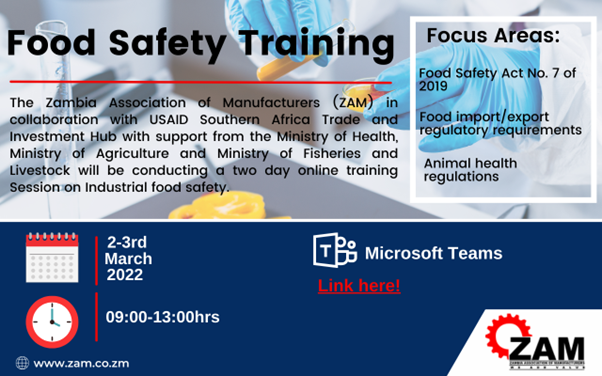
On the 2nd and 3rd of March 2022, ZAM with support from the USAID Southern Africa Trade and Investment Hub (USAID TradeHub) organized the Food Safety and Awareness virtual workshop for manufacturers in the Food Processing sub-sector. The training was undertaken to bridge the knowledge gap in food safety, import and export regulations and necessities, trade agreements and requirements for food production. The Association and the USAID TradeHub partnered with the Ministry of Health, Ministry of Livestock and Fisheries – Department of Veterinary Services and the Ministry of Agriculture – Department of Plant Quarantine and Phytosanitary Service (PQPS) to provide the relevant information during the training session.
Objectives of the training were to improve awareness on the Food Safety Act No. 7 of 2019, regulatory requirements for import and export of food, animals, animal products, plants and plant products. The training further sought to improve awareness on the World Trade Organization (WTO) Sanitary and Phytosanitary (SPS) Agreement, and the relevant local and international SPS standards. The importance of food clearance during importation and exportation was explained as the basis for ensuring good public health in Zambia.
The Ministry of Health (MoH) made a presentation explaining food safety, food laws, issues faced in public health, the National Food Safety Legislation, and the international requirements of food safety in detail as well as outlined the role that MoH plays in food safety to rigorously scrutinise food products and ensure laboratory analysis reports are within prescribed parameters.
A presentation from the Ministry of Agriculture explained phytosanitary measures as procedures undertaken to prevent the introduction or spread of quarantine pests or limit the impact of regulated non-quarantine pests which can be undertaken through inspections, surveillance, or treatment of regulated pests in adherence with reference, conceptual or specific international standards.
The Department of Veterinary Services presented on behalf of the Ministry of Livestock and Fisheries (MLF). The presentation gave an elaborate explanation of the animal health regulations, the process of ceterinary permit issuance and the exportation process.
The key action points that were raised during the workshop include:
- Government to undertake speedy revision of the validity of the Health Clearance Certificate from 14 days to at least a month to incorporate travel time.
- Incorporation of food safety as a requirement for trade to enhance adherence to the Food Safety Laws.
- Government agencies to engage more institutions such ZAM in ensuring adherence to food safety laws as well as raise awareness on the laws that have been put in place for food safety especially with the small and medium enterprises.
- Department of Veterinary Services to take note of all medicines circulating on the market to curb the abuse of antibiotics used in animals which make them anti-microbial resistant leading to outbreaks of diseases


